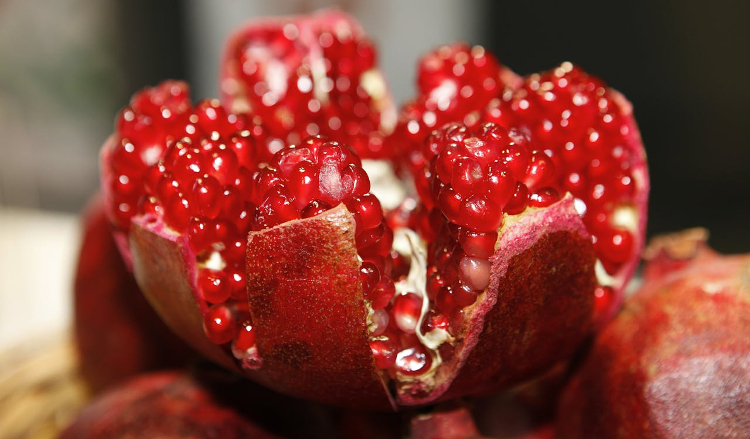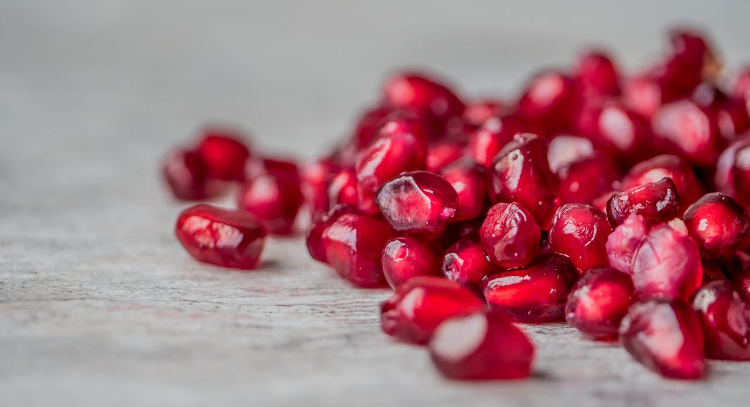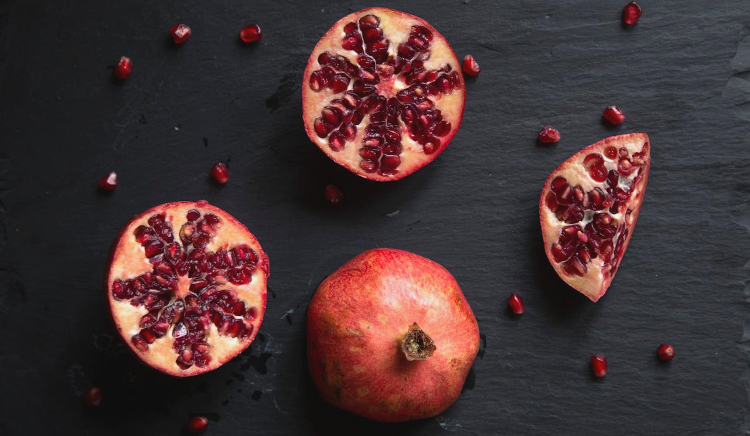Pomegranates have always intrigued me with their vibrant color and unique flavor, but did you know they might also be good for memory function? This is something I recently discovered, and it has completely changed how I look at this fruit. Including pomegranate in my diet has become a simple and enjoyable way to support my brain health. Whether it’s the rich antioxidants or the powerful anti-inflammatory properties, pomegranates offer so much more than just a delicious taste. Let’s explore how this remarkable fruit can be an everyday boon for our memory and overall well-being.

Nutritional Components of Pomegranate
Vitamins and Minerals
Vitamin C
Adding pomegranate to the diet daily gives me a refreshing boost of Vitamin C. This essential nutrient helps protect my brain cells from damage caused by free radicals. For example, I often sprinkle pomegranate seeds over my morning yogurt, making it not only tastier but also more nutritious.
Vitamin K
Vitamin K is another vital nutrient found in pomegranates. It plays a significant role in brain health by supporting cognitive function. When I make salads, I love to include pomegranate seeds because they add a delightful crunch and a dose of Vitamin K, which I know is benefiting my brain.
Folate
Folate is essential for brain function, and pomegranates are a good source of this nutrient. I make a habit of drinking pomegranate juice a few times a week. This simple addition to my diet ensures I’m getting enough folate to support my memory and mental clarity.
Antioxidants
Punicalagins
Punicalagins are powerful antioxidants unique to pomegranates. These compounds help reduce oxidative stress, which is a major factor in cognitive decline. Incorporating pomegranate juice into my smoothies is an easy way to consume these antioxidants regularly.
Anthocyanins
Anthocyanins give pomegranates their vibrant red color and are also potent antioxidants. These compounds help protect the brain from age-related damage. I enjoy mixing pomegranate seeds into my oatmeal, providing both a pop of color and a brain-boosting benefit.
Tannins
Tannins in pomegranates have strong antioxidant properties that can help improve memory function. I’ve noticed that adding pomegranate to my diet has helped me feel more mentally sharp. For instance, a handful of pomegranate seeds as a snack can be a great way to get these beneficial tannins.

Pomegranate and Brain Health
Antioxidant Effects
Reduction of Oxidative Stress Pomegranates are packed with antioxidants that help reduce oxidative stress, a major contributor to cognitive decline. Personally, I’ve felt more alert and focused since incorporating pomegranate juice into my daily routine. For instance, having a glass of pomegranate juice with breakfast has become my go-to start for a brain-boosting day.
Protection of Brain Cells The antioxidants in pomegranates also protect brain cells from damage. I like to make a pomegranate and berry parfait as a midday snack. The combination of different fruits, all rich in antioxidants, provides a delicious and protective treat for my brain.
Anti-Inflammatory Properties
Reduction of Brain Inflammation Pomegranates possess anti-inflammatory properties that help reduce brain inflammation, which is linked to memory problems and cognitive decline. For example, adding pomegranate seeds to my salads has become a simple way to enjoy their anti-inflammatory benefits. I’ve noticed that this small change has helped me feel more mentally clear and focused.
Promotion of Neural Health By promoting neural health, the anti-inflammatory properties of pomegranates support overall brain function. Personally, I enjoy pomegranate seeds in my homemade trail mix. This mix is not only tasty but also a great way to keep my brain healthy while snacking on the go.
Scientific Studies on Pomegranate and Memory
Boosting Memory with Pomegranates: Scientific Insights
Recent studies have highlighted the potential benefits of pomegranate for enhancing memory and cognitive function. A significant compound found in pomegranates, urolithin A, has shown promise in improving memory by removing damaged mitochondria from brain cells, much like the effects seen with NAD supplements. This process, known as mitophagy, helps maintain healthy brain function and could be particularly beneficial in treating neurodegenerative diseases like Alzheimer’s (Neuroscience News).
In addition to this, research on antioxidant blends, including components similar to those in pomegranates, has demonstrated substantial improvements in spatial learning and short-term memory in aged mice. These findings suggest that antioxidants can play a crucial role in combating age-related cognitive decline (Neuroscience News). By incorporating pomegranate into your diet, you may not only enjoy its delicious taste but also support your brain health effectively.

Clinical Trials
Overview of Significant Studies Numerous clinical trials have explored the impact of pomegranate on memory function. For example, one study found that participants who drank pomegranate juice daily showed improved memory performance over a period of time. I always find these studies encouraging because they suggest that simple dietary changes can have a positive impact on cognitive health.
Key Findings and Implications The key findings from these studies indicate that pomegranate can enhance memory and cognitive function. This is likely due to the high levels of antioxidants and anti-inflammatory compounds in the fruit. For me, knowing these benefits motivates me to include pomegranate in my diet regularly.
Animal Studies
Results from Rodent Experiments Animal studies, particularly those involving rodents, have shown promising results regarding pomegranate and memory function. These studies often involve rodents consuming pomegranate extract and then being tested on various memory tasks. The results generally show improved performance, suggesting potential benefits for humans as well. I find these results fascinating and a good reason to keep enjoying pomegranate.
Potential for Human Application While animal studies are not directly transferable to humans, they provide a strong foundation for further research. The positive outcomes in these experiments suggest that pomegranate could have similar benefits for human memory. This potential makes me more inclined to use pomegranate in my meals. For example, I’ve started incorporating pomegranate seeds into my breakfast cereal, giving me a nutritious start to the day.
Practical Ways to Include Pomegranate in Your Diet
Fresh Pomegranate Seeds
Adding to Salads One of the easiest ways to enjoy pomegranate seeds is by adding them to salads. Personally, I love how they add a burst of sweetness and a crunchy texture to my green salads. For example, a spinach salad with cashew cheese, walnuts, and pomegranate seeds is a delightful and healthy option that I frequently enjoy.
Snack Ideas Pomegranate seeds make for a convenient and nutritious snack. I often keep a bowl of fresh seeds in the fridge and grab a handful when I need a quick energy boost. They’re not only delicious but also packed with antioxidants, making them a perfect snack choice. For instance, mixing them with a bit of Greek style soy yogurt creates a satisfying and brain-healthy treat.

Pomegranate Juice
Recommended Daily Intake Drinking pomegranate juice is another excellent way to incorporate this fruit into your diet. From what I’ve read and experienced, about 8 ounces a day is a good amount to reap the benefits. For me, having a glass of pomegranate juice with breakfast is a refreshing start to the day. It’s a simple habit that can make a big difference in supporting memory function.
Benefits and Precautions While pomegranate juice is beneficial, it’s important to consume it in moderation due to its natural sugar content. Personally, I prefer freshly squeezed juice to avoid added sugars found in many commercial brands. For example, when I make fresh juice at home, I enjoy it straight or mix it with sparkling water for a refreshing beverage.
Pomegranate Supplements
Types of Supplements Available If fresh pomegranate or juice isn’t always convenient, supplements can be a good alternative. There are various forms available, including capsules, extracts, and powders. I’ve tried pomegranate extract capsules, which are an easy way to ensure I’m getting the benefits without having to prepare the fruit every day.
Dosage and Effectiveness When it comes to dosage, following the recommendations on the supplement label is crucial. Generally, you will find that taking one or two capsules a day works well. It’s an effective way to incorporate pomegranate into your routine, especially on busy days when you might not have time to prepare fresh fruit.

Reap the Benefits of Pomegranate for a Sharper Mind
Adding pomegranate to your diet can be a tasty and effective way to support your memory function and overall brain health. The vibrant seeds and refreshing juice not only add flavor and color to your meals but also provide essential nutrients and powerful antioxidants. By making pomegranate a regular part of your diet, you can take a proactive step towards better cognitive health.
If you enjoyed this article you may also like some of our other content:
– Belly Busters: Does Maqui Berry Help With Weight Loss?
– Maqui Berry Benefits: Discover the Ultimate Superfood
Share, subscribe and do the thang!
Thanks for reading!
The Very Berry Team 🙂
*Disclaimer: The content provided on this page is for informational purposes only and is not intended as medical advice, diagnosis, or treatment. The author of this page is not a medical professional. Always seek the advice of your physician or other qualified health provider with any questions you may have regarding a medical condition. Never disregard professional medical advice or delay in seeking it because of something you have read on this page.
Leave a Reply